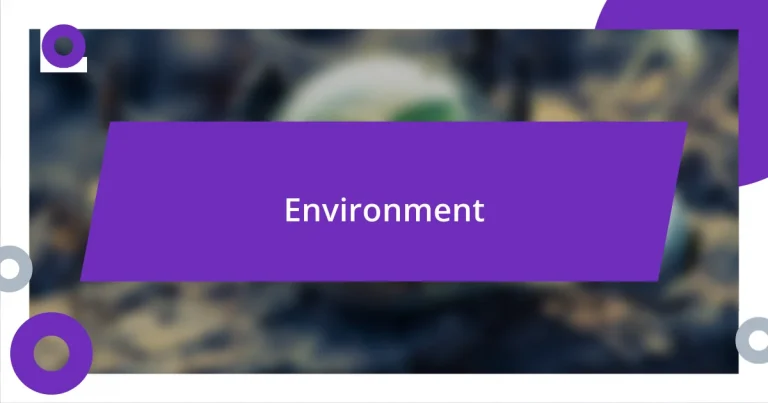Key takeaways:
- The author experienced a transformative journey when discovering educational journals, igniting a passion for engaging with complex academic material.
- Journaling provides significant benefits such as enhanced comprehension, reflective thinking, and personal growth, fostering a deeper engagement with learning.
- Effective journaling involves creating a consistent habit, using structured entries and prompts, and sharing insights to aid in self-discovery and emotional growth.
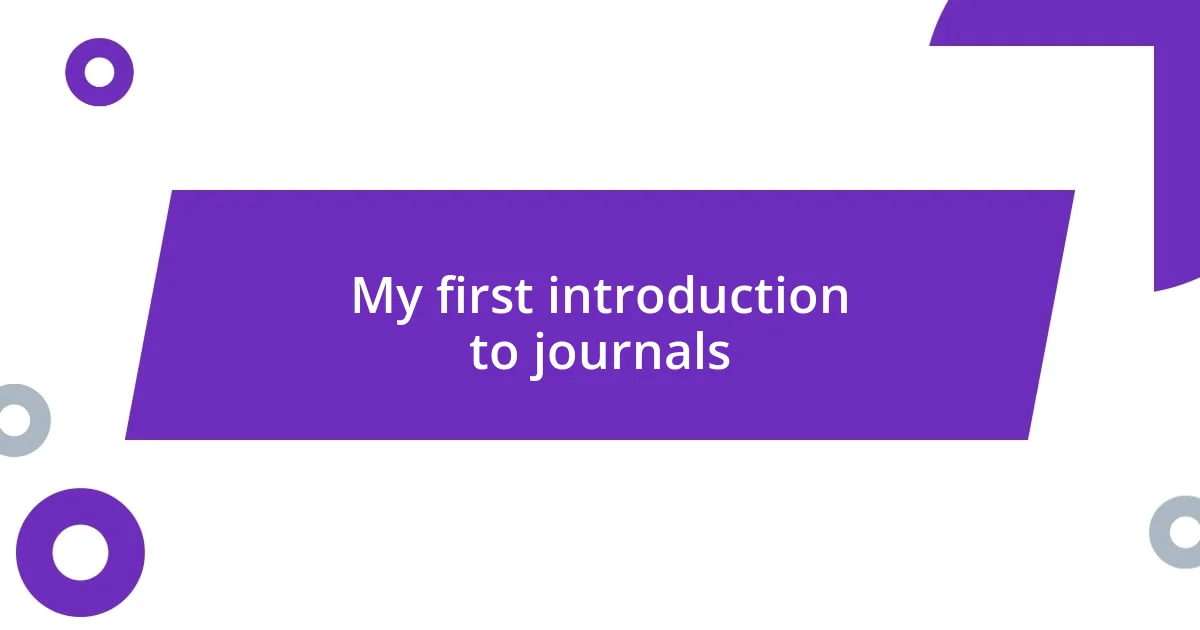
My first introduction to journals
I still vividly remember the day I stumbled upon my first educational journal. It was a quiet afternoon when I found a dusty copy tucked away in a corner of my college library. As I flipped through the pages filled with research studies and academic reflections, I was both fascinated and bewildered—was this what serious scholars read?
That moment sparked a whirlwind of questions in my mind: How could such dense material be engaging? Yet, I felt a magnetic pull. I could sense the conversations unfolding between the authors and their audience—it was as if I was privy to a deeper world of knowledge that extended beyond textbook readings. I wanted to be part of that dialogue.
The first time I decided to write in my own journal, it felt like stepping into uncharted territory. I poured my thoughts onto the pages, questioning everything I’d learned and sharing personal insights. It was liberating to express my academic struggles and triumphs in a space that felt entirely my own. Have you ever experienced that rush of clarity when thoughts finally find their words? For me, that was the beginning of a lifelong journey with journals.
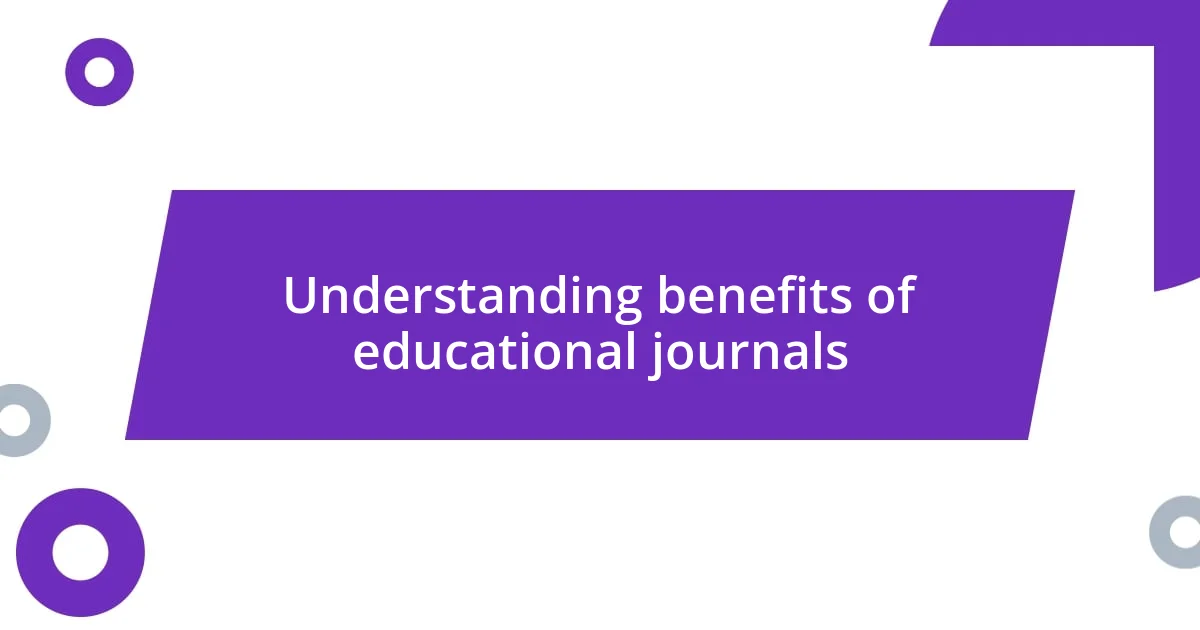
Understanding benefits of educational journals
Engaging with educational journals has profoundly shaped my academic journey. I discovered that journaling not only helps in clarifying complex ideas but also encourages deeper reflection on my learning experiences. I remember a late-night session poring over a challenging topic in my journal, and as I wrote, connections between concepts began to emerge—suddenly, everything clicked into place. It felt like unlocking a treasure chest of understanding.
The benefits of using educational journals are particularly significant and can be summarized as follows:
- Enhanced Comprehension: Writing helps distill ideas and solidify learning.
- Reflective Thinking: Journals provide a private space for reflection, promoting critical analysis.
- Improved Writing Skills: Regular practice hones writing and articulation.
- Personal Growth: Documenting struggles and successes fosters self-awareness and growth.
- Engagement with Material: Engaging actively with content deepens interest and retention.
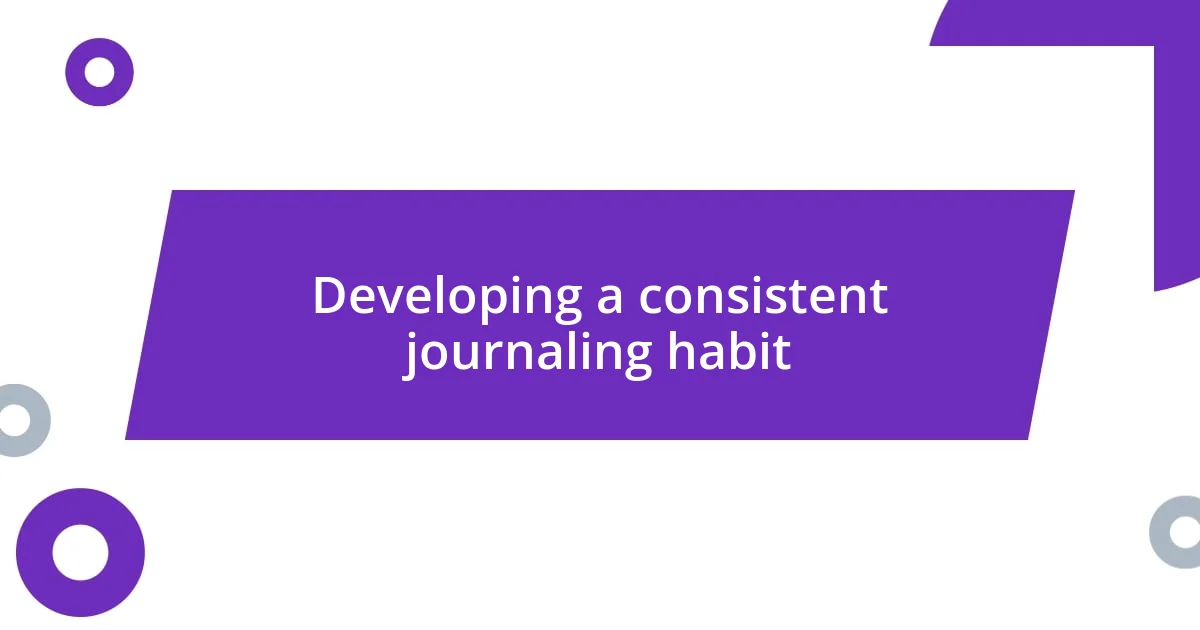
Developing a consistent journaling habit
Developing a consistent journaling habit can sometimes feel like an uphill battle, especially when life gets busy. I recall those early days when I would set grand intentions to write daily, but often found myself skipping days or feeling overwhelmed by blank pages. It wasn’t until I began setting aside just ten minutes each evening, often with a warm cup of tea in hand, that I noticed a significant change. Creating a small, dedicated space for journaling helped me build a routine without the pressure of perfection.
Cultivating a journaling habit means finding what resonates personally. For instance, I experimented with themed journal entries, such as “Gratitude Fridays,” where I would jot down three things I appreciated that week. This practice not only made writing enjoyable, but it also created a sense of anticipation each week. With time, I discovered that consistency flourishes when journaling feels more like a cherished ritual and less like another task on my checklist.
Reflecting on my journey, I’ve learned that journaling is about progress, not perfection. I no longer worry about the quality of my entries; instead, I focus on the act of writing itself. Embracing the imperfections and the freedom to write whatever comes to mind has transformed this practice into a vital part of my day. What started as a challenge has evolved into a source of daily joy and reflection.
| Strategies for Consistent Journaling | Benefits |
|---|---|
| Setting a specific time | Creates habit and anticipation |
| Themed entries | Makes writing enjoyable and diverse |
| Short daily reflections | Encourages mindfulness and clarity |
| Creating a dedicated space | Promotes focus and reduces distractions |
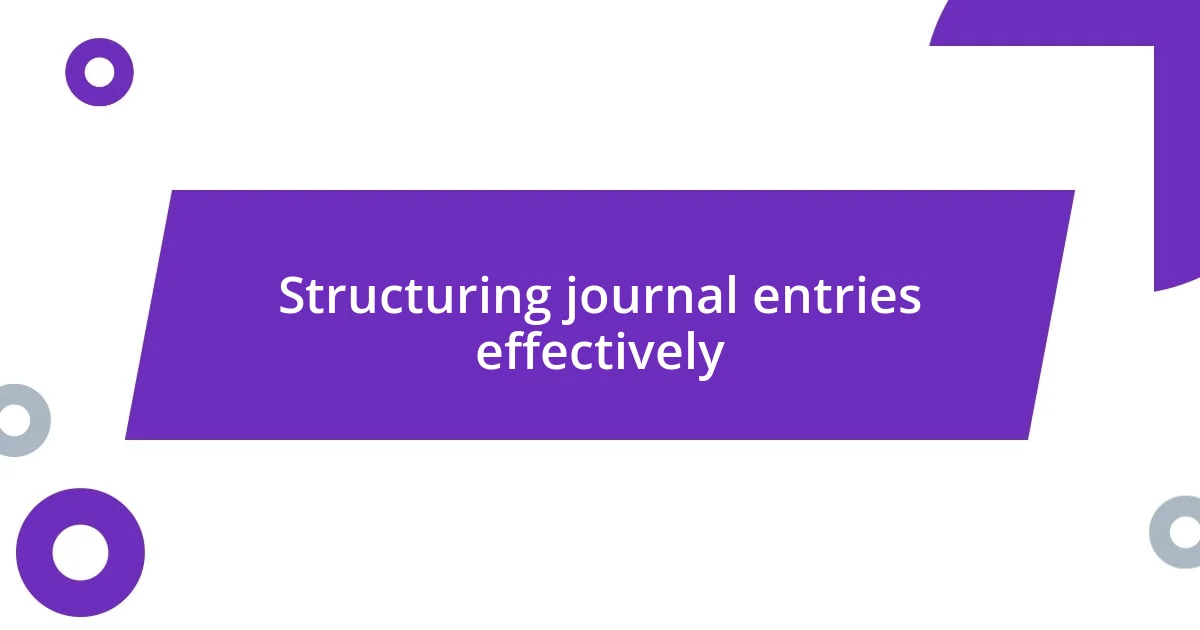
Structuring journal entries effectively
Structuring journal entries effectively can greatly enhance the value of your reflections. I remember grappling with how to organize my thoughts initially; random entries often felt chaotic. However, adopting a simple structure—starting with a date, followed by key thoughts, and concluding with a reflection—transformed my approach. This method not only fostered clarity but also made it easier to revisit past entries.
I also found that incorporating prompts into my journaling practice revolutionized my writing process. Rather than staring at a blank page, I used questions like “What did I learn today?” or “How did I face a challenge?” to guide my entries. It became a delightful conversation with myself, inviting deeper exploration of my experiences. Have you ever noticed how a well-directed question can unlock a flood of ideas?
Lastly, bullet points can be a game-changer for those days when you feel overwhelmed. I often jot down thoughts in list format, which keeps the flow light and digestible. This technique not only reduces pressure but also enhances my ability to capture fleeting ideas. When I genuinely embraced this flexible structure, my journaling became a vibrant tapestry of thoughts and feelings, revealing insights that I could easily trace back in time.

Sharing insights from my journal
Sharing insights from my journal has been one of the most rewarding aspects of my writing journey. I remember one entry where I reflected on a difficult conversation I had earlier in the week; after writing it all down, I realized how much I had learned about my communication style and the importance of listening. Have you ever experienced that moment of clarity while jotting down your thoughts? It’s as if the act of writing brings hidden lessons to the surface.
Another profound insight emerged during a particularly challenging period in my life. I wrote about my feelings of frustration and uncertainty, and the exercise helped me pinpoint what truly mattered to me. That experience reinforced the idea that journaling is more than just a record of events; it’s a powerful tool for self-discovery. I often find myself looking back at those raw entries, and they’ve become milestones in my emotional growth. Do you find comfort in reading old journal entries too?
In sharing these insights, I’ve come to appreciate the unique lens through which journaling allows me to view my experiences. Every time I pick up my pen, I’m not just documenting my life; I’m engaging in a dialogue with my past self. Sometimes, I reflect on how my perspective has changed over time. It’s fascinating to see the evolution of my thoughts in black and white, reminding me that growth often comes from grappling with discomfort and uncertainty. Isn’t it amazing how a simple act like journaling can deepen our understanding of ourselves?












